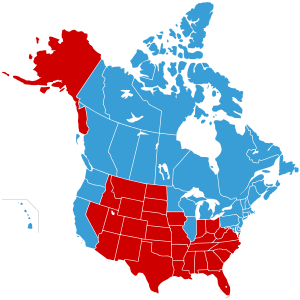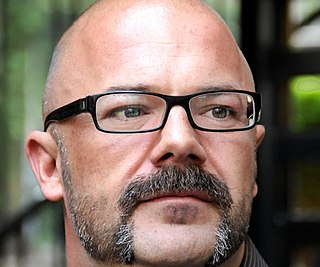
Andrew Michael Sullivan is a British-American author, editor, and blogger. Sullivan is a political commentator, a former editor of The New Republic, and the author or editor of six books. He started a political blog, The Daily Dish, in 2000, and eventually moved his blog to platforms, including Time, The Atlantic, The Daily Beast, and finally an independent subscription-based format. He announced his retirement from blogging in 2015. From 2016 to 2020, Sullivan was a writer-at-large at New York. His newsletter The Weekly Dish was launched in July 2020.
A Red Tory is an adherent of a centre-right or paternalistic-conservative political philosophy derived from the Tory tradition, most predominantly in Canada but also in the United Kingdom where it is more commonly known as one nation conservatism. This philosophy tends to favour communitarian social policies, while maintaining a degree of fiscal discipline and a respect of social and political order. It is contrasted with "Blue Tory" or "High Tory". Some Red Tories view themselves as small-c conservatives.

Mark Adam Foley is an American former politician who served as a member of the United States House of Representatives. He served from 1995 until 2006, representing the 16th District of Florida as a member of the Republican Party, before resigning due to revelations that he had sent sexually explicit messages to teenaged boys who had served as congressional pages in what came to be known as the Mark Foley scandal.
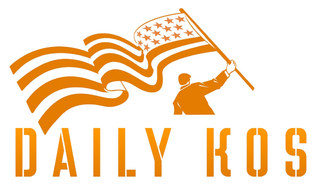
Daily Kos is a group blog and internet forum focused on the U.S. Democratic Party and progressive liberal American politics. The site publishes blog posts, polls, election and campaign fundraising data, and is considered an example of "netroots" activism.
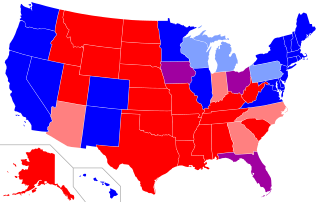
Starting with the 2000 United States presidential election, the terms "red state" and "blue state" have referred to U.S. states whose voters vote predominantly for one party — the Republican Party in red states and the Democratic Party in blue states — in presidential and other statewide elections. By contrast, states where the vote fluctuates between the Democratic and Republican candidates are known as "swing states" or "purple states". Examining patterns within states reveals that the reversal of the two parties' geographic bases has happened at the state level, but it is more complicated locally, with urban-rural divides associated with many of the largest changes.
In American politics, a conservative Democrat is a member of the Democratic Party with more conservative views than most Democrats. Traditionally, conservative Democrats have been elected to office from the Southern states, rural areas, the Rust Belt, and the Midwest. In 2019, the Pew Research Center found that 14% of Democratic and Democratic-leaning registered voters identify as conservative or very conservative, 38% identify as moderate, and 47% identify as liberal or very liberal.

Dahlia Lithwick is a Canadian-American lawyer, writer, and journalist. Lithwick is currently a contributing editor at Newsweek and senior editor at Slate. She primarily writes about law and politics in the United States. She writes "Supreme Court Dispatches" and "Jurisprudence" and has covered the Microsoft trial and other legal issues for Slate. In 2018, the Sidney Hillman Foundation awarded Lithwick with the Hillman Prize for Opinion & Analysis Journalism noting that she "has been the nation's best legal commentator for two decades".
Conservatism in Canada is generally considered a movement which is primarily represented by the modern-day Conservative Party of Canada in federal party politics, as well as various centre-right and right-wing parties at the provincial level. Far-right politics have never been a prominent force in Canadian society. The first party which called itself "Conservative" in what would become Canada was elected in the Province of Canada election of 1854.
Fiscal conservatism or economic conservatism is a political and economic philosophy regarding fiscal policy and fiscal responsibility with an ideological basis in capitalism, individualism, limited government, and laissez-faire economics. Fiscal conservatives advocate tax cuts, reduced government spending, free markets, deregulation, privatization, free trade, and minimal government debt. Fiscal conservatism follows the same philosophical outlook as classical liberalism. This concept is derived from economic liberalism.

The term right-wing alternative media in the United States usually refers to internet, talk radio, print, and television journalism. They are defined by their presentation of opinions from a conservative or right wing point of view and politicized reporting as a counter to what they describe as a liberal bias of mainstream media.
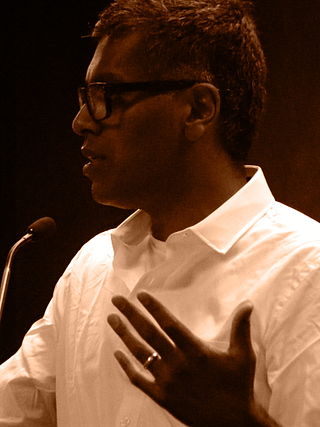
Sudhir Alladi Venkatesh is an American sociologist and urban ethnographer. He is William B. Ransford Professor of Sociology & African-American Studies at Columbia University, a position he has held since 1999. In his work, Venkatesh has studied gangs and underground economies, public housing, advertising and technology. As of 2018, he is the Director of Signal: The Tech & Society Lab at Columbia University.
Green conservatism is a combination of conservatism with environmentalism. Environmental concern has been voiced by both conservative politicians and philosophers throughout the history of conservatism. One of the of most prominent early philosophers of conservatism, Edmund Burke, in his Reflections on the Revolution in France (1790), quoted as saying: "The earth, the kind and equal mother of all ought not to be monopolised to foster the pride and luxury of any men."
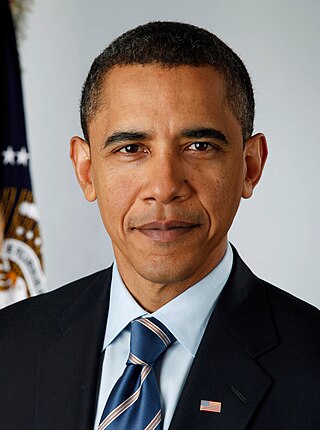
The 2008 United States presidential election in Vermont took place on November 4, 2008, concurrent with the federal election in all 50 states and D.C., which was part of the 2008 United States presidential election. Voters chose three representatives, or electors to the Electoral College, who voted for president and vice president.
Barry E. Friedman is an American academic and one of the country's leading authorities on constitutional law, policing, criminal procedure, and federal courts, working at the intersections of law, politics and history. Friedman teaches a variety of courses including Judicial Decisionmaking, Federal Courts and the Federal System, and Criminal Procedure: Fourth and Fifth Amendments, as well as a seminar on Democratic Policing. He writes about judicial review, constitutional law and theory, federal jurisdiction, judicial behavior, and policing. His scholarship appears regularly in the nation's top law and peer-edited reviews.
Social conservatism in the United States is a political ideology focused on the preservation of traditional values and beliefs. It focuses on a concern with moral and social values which proponents of the ideology see as degraded in modern society by liberalism. In the United States, one of the largest forces of social conservatism is the Christian right.
Progressive conservatism is a political ideology that attempts to combine conservative and progressive policies. While still supportive of capitalist economy, it stresses the importance of government intervention in order to improve human and environmental conditions.
"Cuckservative" is a pejorative formed as a portmanteau of "cuck", an abbreviation of the word "cuckold", and the political designation "conservative". It has become a derogatory label used by white nationalists and the alt-right in the United States to denigrate other conservatives.

Wojak, also known as Feels Guy, is an Internet meme that is, in its original form, a simple, black-outlined cartoon drawing of a bald man with a wistful expression. The origin of the Wojak illustration is unknown. It may have emerged in 2009 on a Polish imageboard named vichan, from where it was later reposted to the German imageboard krautchan in 2010 by a poster called "wojak". It was posted on December 16, 2009, on an image aggregation website.

The NPC, derived from non-player character, is an Internet meme that represents people who do not think for themselves or do not make their own decisions; those who lack introspection or intrapersonal communication. The meme gained further viral status on TikTok, with the popularity of "NPC Streamers". In terms of politics, it's often been used by those with anti-establishment views to describe those who fail to question authority, "groupthink", or a stance that would display conformity and obedience. The NPC meme, which graphically is based on the Wojak meme, was created in July 2016 by an anonymous author and first published on the imageboard 4chan, where the idea and inspiration behind the meme were introduced.
